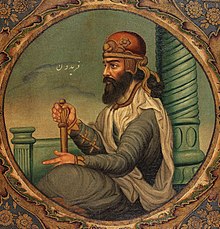Fereydun
Ferydun A hero of Iranian myths and legends | |
|---|---|
| فریدون | |
 Oil paintingof Fereydun. Made inQajar Iranduring the mid-19th-century. | |
| Born | |
| Other names | Afereydun(آفریدون) |
| Known for | Victory overAzhi Dahaka |
| Spouse | ArnavazShahrnaz |
| Children | SalmTurIraj |
| Parents | |
Fereydun(Avestan:𐬚𐬭𐬀𐬉𐬙𐬀𐬊𐬥𐬀,romanized:Θraētaona,Middle Persian:𐭯𐭫𐭩𐭲𐭥𐭭,Frēdōn;New Persian:فریدون,Fereydūn/Farīdūn) is anIranian mythical kingandherofrom thePishdadian dynasty.He is known as an emblem of victory, justice, and generosity inPersian literature.[1]
According to Abolala Soudavar, Fereydun is partially a reflection ofCyrus the Great(r. 550 – 530 BC), the firstAchaemenidKing of Kings.[2]
Etymology[edit]
All of the forms of the name shown above derive, by regular sound laws, fromProto-Iranian*Θraitauna-(AvestanΘraētaona-) andProto-Indo-Iranian*Traitaunas.
Traitaunas is a derivative (withaugmentativesuffix -una/-auna) ofTritas,the name of a deity or hero reflected in the VedicTritaand the AvestanΘrita.Both names are identical to the adjective meaning "the third", a term used of a minor deity associated with two other deities to form atriad.In the IndianVedas,Trita is associated withthunder godsandwind gods.Trita is also calledĀptya,a name that is probably cognate withĀθβiya,the name of Thraetaona's father in theAvestā,Zoroastrian texts collated in the third century. Traitaunas may therefore be interpreted as "the great son of Tritas". The name was borrowed fromParthianintoClassical ArmenianasHrudēn.
In Zoroastrian literature[edit]
In theAvestā,Thraetaona is the son ofAθβiya,and so is calledĀθβiyāni,meaning "from the family ofAθβiya".He was recorded as the killer of the dragonZahhak(Aži Dahāk).
On the contrary, in Middle Persian texts, Dahāka/Dahāg was instead imprisoned onMount DamavandinAmol.
In theShahnameh[edit]
According toFerdowsi'sShahnameh,Fereydun was the son ofĀbtin,one of the descendants ofJamšid.Fereydun, together withKāve,revolted against the tyrannical king,Zahāk,defeated and arrested him in theAlborz Mountains.Afterwards, Fereydun became the king, marriedArnavāzand, according to the myth, ruled the country for about 500 years. At the end of his life, he allocated his kingdom to his three sons,Salm,Tur,andIraj.
Iraj was Fereydun's youngest and favored son, and inherited the best part of the kingdom, namely Iran. Salm inheritedAnatolia( "Rûm",more generally meaning theRoman Empire,the Greco-Roman world, or just "the West" ), and Tur inheritedCentral Asia( "Turān",all the lands north and east of theAmu Darya,as far asChina), respectively. This aroused Iraj's brothers' envy, and encouraged them to murder him. After the murder of Iraj, Fereydun enthroned Iraj's grandson,Manučehr.Manučehr's attempt to avenge his grandfather's murder initiated theIranian-Turanianwars.
See also[edit]
References[edit]
- ^Tafazzoli 1999,pp. 531–533.
- ^Soudavar 2012,p. 53.
Sources[edit]
- Soudavar, Abolala (2012). "Astyages, Cyrus and Zoroaster: Solving a historical dilemma".Iran.50:45–78.doi:10.1080/05786967.2012.11834712.JSTOR24595838.S2CID194229337.(registration required)
- Tafazzoli, Ahmad (1999)."Ferēdūn".InYarshater, Ehsan(ed.).Encyclopædia Iranica, Volume IX/5: Fauna III–Festivals VIII.London and New York: Routledge & Kegan Paul. pp. 531–533.ISBN978-0-933273-33-7.
External links[edit]
- Stuart Cary WelchA king's book of kings: the Shah-nameh of Shah Tahmasp,1972, Metropolitan Museum of Art (New York, N.Y.),ISBN0-87099-028-4,catalog from an exhibition May 4-July 4, 1972 (open access), 201 pp, 49MB, contains material on 'Faridun' PDF pages 104, 112, 116, 120, 124
- First Iranian Legendary Heroes and Heroines:A Research Note by Manouchehr Saadat Noury



